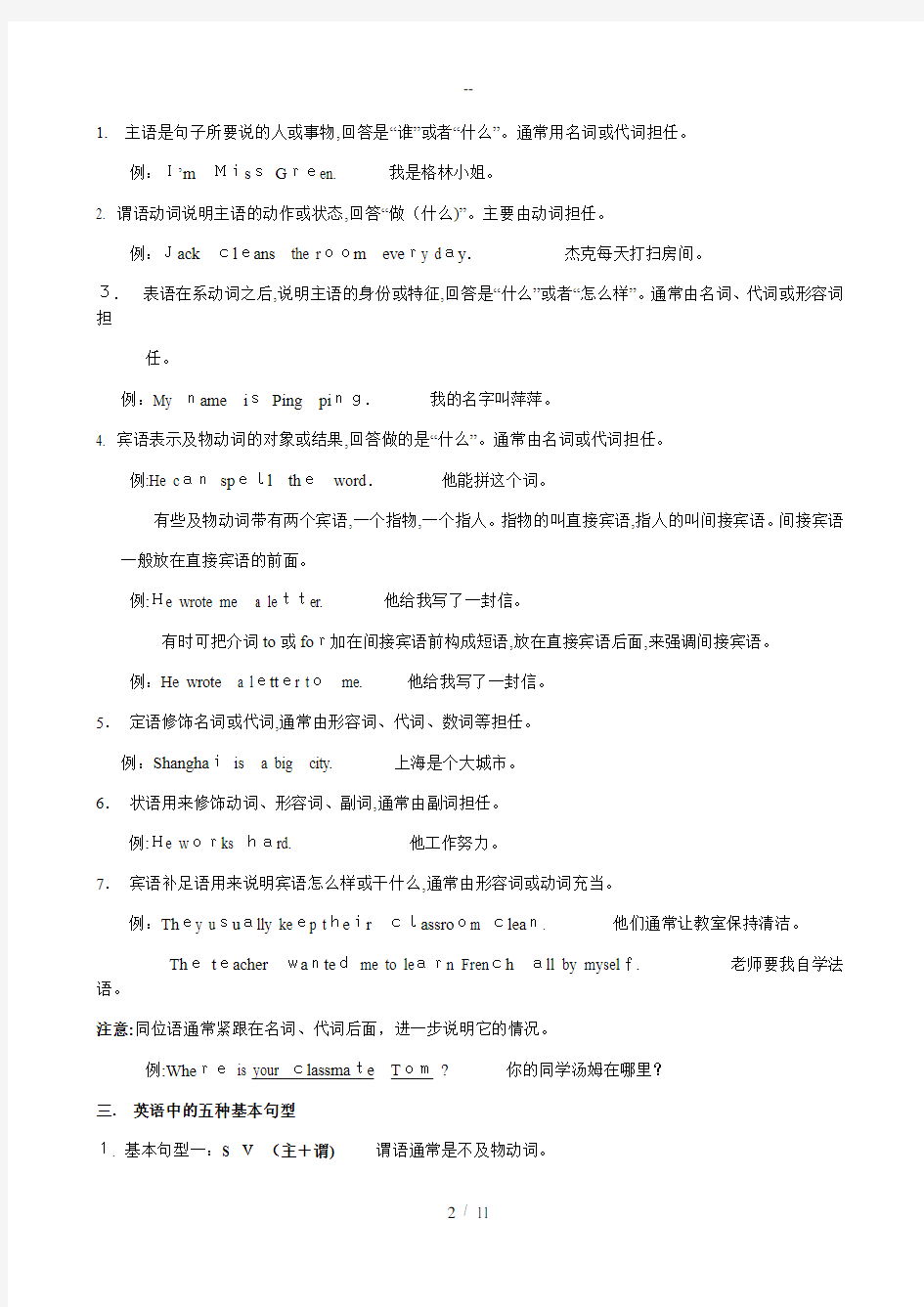

英语语法归纳总结及倒装句
语法归纳总结
一. 词类
英语词类分十种:名词、形容词、代词、数词、冠词、动词、副词、介词、连词、感叹词。1.名词(n.):表示人、事物、地点或抽象概念的名称。
例:boy,morning, bag,home,class,orange.
2. 代词(pron.):主要用来代替名词。
例:who,she, you, it .
3.形容词(adj..):表示人或事物的性质或特征。
例:good,right, white.
4. 数词(num.):表示数目或事物的顺序。
例:one, two,three, first,second, third,fourth.
5. 动词(v.):表示动作或状态。
例:am, is,are,have,see .
6.副词(adv.):修饰动词、形容词或其他副词,说明时间、地点、程度等。
例:now, very,here, often, quietly,slowly.
7.冠词(art..):用在名词前,帮助说明名词。
例:a, an, the.
8. 介词(prep.):表示它后面的名词或代词与其他句子成分的关系。
例:in,on,from, above,behind.
9. 连词(conj.):用来连接词、短语或句子。
例:and, but, before .
10. 感叹词(interj..):表示喜、怒、哀、乐等感情。
例:oh,well, hi,hello.
二. 句子成分
英语句子成分分为七种:主语、谓语、宾语、定语、状语、表语、宾语补足语。
1.主语是句子所要说的人或事物,回答是“谁”或者“什么”。通常用名词或代词担任。
例:I’mMissGreen. 我是格林小姐。
2. 谓语动词说明主语的动作或状态,回答“做(什么)”。主要由动词担任。
例:Jackcleans the room every day.杰克每天打扫房间。
3.表语在系动词之后,说明主语的身份或特征,回答是“什么”或者“怎么样”。通常由名词、代词或形容词担
任。
例:My name isPing ping.我的名字叫萍萍。
4. 宾语表示及物动词的对象或结果,回答做的是“什么”。通常由名词或代词担任。
例:He canspell theword.他能拼这个词。
有些及物动词带有两个宾语,一个指物,一个指人。指物的叫直接宾语,指人的叫间接宾语。间接宾语一般放在直接宾语的前面。
例:He wrote me a letter. 他给我写了一封信。
有时可把介词to或for加在间接宾语前构成短语,放在直接宾语后面,来强调间接宾语。
例:He wrote a letter tome. 他给我写了一封信。
5.定语修饰名词或代词,通常由形容词、代词、数词等担任。
例:Shanghaiis a big city. 上海是个大城市。
6.状语用来修饰动词、形容词、副词,通常由副词担任。
例:He works hard. 他工作努力。
7.宾语补足语用来说明宾语怎么样或干什么,通常由形容词或动词充当。
例:They usually keep theirclassroom clean. 他们通常让教室保持清洁。
Theteacherwantedme to learn Frenchall by myself.老师要我自学法语。
注意:同位语通常紧跟在名词、代词后面,进一步说明它的情况。
例:Whereis your classmate Tom?你的同学汤姆在哪里?
三.英语中的五种基本句型
1. 基本句型一:S V(主+谓)谓语通常是不及物动词。
例:The moon rose.月亮升起了。
What he saiddoes not matter.他所讲的没有什么关系。?2. 基本句型二:SVP (主+谓+表)
此句型的句子有一个共同的特点:句子谓语动词都不能表达一个完整的意思,必须加上一个表明主语身份或状态的表语构成复合谓语,才能表达完整的意思。这类动词叫做连系动词。系动词分两类:be,look, keep,seem等属一类,表示情况;get, grow, become, turn, stay, remain等属另一类,表示变化。另外感官动词如sound, smell,listen, taste等用法同be动词。be 本身没有什么意义,只起连系主语和表语的作用。其它系动词仍保持其部分词义。
例:This is an English-Chinese dictionary.这是本英汉辞典。? The dinner smells good.晚餐的气味很好。
3.基本句型三:SVO(主+谓+宾)
此句型句子的共同特点是:谓语动词都具有实义,都是主语产生的动作,但不能表达完整的意思,必须跟有一个宾语,即动作的承受者,才能使意思完整。这类动词叫做及物动词。
例:He has refused to help them. 他拒绝帮他们的忙。
They ate what wasleftover. 他们吃了剩饭。
4. 基本句型四:S VO间O直(主+谓+间宾+直宾)
此句型的句子有一个共同特点:谓语动词必须跟有两个宾语才能表达完整的意思。这两个宾语一个是动作的直接承受者,另一个是动作的间接承受者。通常这一间接承受者用一个介词来连接,当动作的间接承受者在动作的直接承受者之前时,这一介词往往被省略。
例:Hebrought you a dictionary. 他给你买了一本字典。? Itold him that thebuswas late.我告诉他汽车晚点了。
5.基本句型五:S VO C(主+谓+宾+宾补)
此句型的句子的共同特点是:动词虽然是及物动词,但是只跟一个宾语还不能表达完整的意思,必须加上一个补充成分来补足宾语,才能使意思完整。
例:Theypaintedthedoorgreen.他们把门漆成绿色。
Isaw them getting onthebus. 我看见他们上了那辆公共汽车。
但常用的英语句子并不都像基本句型这样简短,这些句子除了基本句型的成分不变外,通常是在这些成分的前面或后面增加一些修饰语而加以扩大。这些修饰语可以是单词(主要是形容词、副词和数词),也可以是各种类型的短语(主要是介词短语、不定式短语和分词短语)。下面以基本句型五为例:Wefound thehall full.我们发现礼堂坐满了。
Wefound the great hallfullof students andteachers.我们发现大礼堂坐满了学生和教师。? We found thegreat hallfullof students and teachers listening to animportant report.? 我们发现大礼堂坐满了学生和教师,在听一个重要报告。? We found thegreat hall fullof students and teachers listening to an important report made by a comrade from
the People's Daily oncurrentaffairs in East Europe.?我们发现大礼堂坐满了学生和教师,在听人民日报的一位同志作有关东欧局势的重要报告。
倒装句
英语句子的自然语序是主语在前,谓语动词在后。如果把谓语动词放在主语之前,就称为倒装结构;如果谓语全部放在主语之前,就称为完全倒装;如果只把助动词、be动词或情态动词放在主语之前,就称为部分倒装。
完全倒装
1. 以here,there,now,then开头,谓语动词是be,come, go,follow 等词,主语为名词。
例:Now comes your turn toanswer thequestions.
2.以up,down, out, in,away, off 等表示移动方向的副词开头的句子, 谓语通常为go,com e,rush,fly,fall 等不及物动词,主语为名词。
例:Out rushed the boy.
【注意】以上两种句型中,若主语是代词,即使here,there,now,then, up,down,o ut,in, away, off等放在
句首,也不用倒装。
例:Outhe rushed.Here youare!
3. 表示地点的介词短语或副词(短语如onthe wall,under thetree,in front of thehouse,inthemiddle ofthe room等)位于句首,谓语是不及物动词,主语是名词。
例:Between the two buildingsstands a tall tree.
East ofthecity lies a big river.
4.表语位于句首,构成“形容词/ 现在分词/过去分词+连系动词+主语”结构。
例:Present at themeeting were Professor Smithand many other guests.
5. 代词such作表语,位于句首时。
例:Such arethe facts: no onecan deny (拒绝)them.
6.保持句子平衡或使上下文衔接更紧密时。
例:Inside thepyramids (金字塔)arethe rooms forthe kings andqueens and long passages to these rooms.
例题赏析:
— Iseveryonehere?
—Notyet.Look ,there _______therest of our guests!
A.come B.comesC.is coming D. are coming
【解析】谓语动词根据后面的主语可知是完全倒装,因此选择A。
完全倒装练习
1. ________abeautiful palace ________the foot of the hill.
A.There stand;at ? B. Therestands; under? C. Standsthere; under D.Therestands; at
2. ________from the top of the building whenthe policemanpointed thegun athim.? A. Jumped down the robber B.Jumpedthe robberdown
C.Down jumped the robber
D. Downthe robber jumped
3. ________ are the dayswhenteachers were lookeddown upon.?A.Gone
B. Go?C.To goD.Going
4.Atthemeetingplaceof theYangtze River andtheJialingRiver________, one of the tenlargestcities inChina.
A. lies Chongqing?B.Chongqing lies
C. does lie Chongqing? D.does Chongqing lie
5.For amoment nothing happened,then________all shouting together.A.voices had come B. camevoices
C. voices would come D.didvoices come
部分倒装
1. only修饰副词、介词短语或状语从句,且放在句首时。
例:Only inthiswaycan we learn English well.
Only when he returneddid wefind outthe truth.
【注意】(1)only在句首修饰状语从句时,从句不倒装,主句需部分倒装。
(2)only在句首修饰主语时,句子不倒装。
例:OnlySenior 3studentsare allowed toenter thisreading room.
2.never,hardly, scarcely,seldom, little,not until, not, in no case等表示否定意义的副
词或短语位于句首。
例:Hardly had we arrived home whenitbegan to rain.
Not until he tookoff his dark glasses did Irecognizehim.
3. 表示前句所说的某种情况也适合于另外的人或物,用“so/neither/nor+助动词/be动词/情态动词
+主语”。
例:He is ateacher. So am I.
【注意】(1)“so+主语+助动词/be动词/情态动词”是对前面内容的肯定或附和。
例:--- It isa fineday today. ---So it is.
(2)若前句情况较复杂,既有否定又有肯定,或既有be动词又有助动词,则用
“Soitiswith sb./sth.” 或“It is thesame withsb./sth.” 结构。
例:Tom isastudent and hestudies hard. Soit is withhissister.
4. not only…butalso…连接并列的句子,且not only放在句首时,前句倒装,后句不倒装。
例:Notonly does he knowEnglish well, but also he speaksfluent Frenc h.
5.neither…nor…连接并列的句子,前后两句都倒装。
例:Neither will hesettlein America norwillhe allow his children todoso.
6.so…that…; such…that…中的so或such及修饰的成分放于句首时前句倒装,后句不倒装。
例:So angrywas thefatherthathe could not say a word.
(因为谓语动词只有一个be动词,因此be放在主语之前,形成全部倒装。)
So fastdid timefly that half ayear hadgone by before I knew it.
7. as引导的让步状语从句中,表语(名词、形容词)、状语(副词)、动词原形位于句首,主语和谓语语序
不变。表语是可数名词单数时,冠词省略。
例:Tryas I would,I couldn’tmake himchange the plan.
8.当if虚拟条件句中谓语部分含有were,should 或助动词had时,可以省略if,把were, should或h ad放
到句首,形成部分倒装。
例:Wereitto rain tomorrow,wewould not go sightseeing.
9.在以often, well, many a time, now and again等方式或频度副词(短语)开头的句子中,要用部分倒装结构。
例:Oftenhave wemade that test.
10. 用于某些表示祝愿的句子里
例:Mayyousucceed!
例题赏析:
1. — It’s nice. Neverbefore____ such a specialdrink!
—I’mgladyoulike it.
A. I havehad
B. Ihad C.have I hadD. had I 【解析】never是否定副词,置于句首,句子要部分倒装;由语意可知说话人以前从未喝过这样特别的饮料,应该用现在完成时,故选C项。
2. Only whenhe reached the tea-house ______ it was thesame place he’d beenin last year.
A. he realized B. he didrealizeC.realizedhe D.did he realize
【解析】Only引导的状语从句位于句首,应把主句中动词的助动词提前构成部分倒装,故选D项。
部分倒装练习
6. Little________ about herownsafety, thoughshe was ingreat dangerhersel f.
A. didRosecareB.Rose did careC.Rose doescare D.does Rose care
7.Not until I came home last night ________ to bed.
A.Mumdidgo B.did Mum goC. wentMumD. Mum went
8. Itwas announced thatonly whenthe fire wasunder control________to return to their homes.
A. theresidentswould be permitted B. had theresidents beenpermitted
C.wouldthe residents be permitted D. theresidents had been permitted
9. — Have you ever seen anything likethat before?
— No, ________anything like that before.
A. Inever have seenB.never Ihave seen
10.Only when themeeting was oC. never have I seen D. I have seen?
ver________ go backtomeet his friend.
A. he could B.hewas able to
C.was he able toD.was able to he
倒装句练习
1.Manya time________ swimming alone.? A. the boy went? B. went the boy
C. did the boygo??
D. didgo theboy
2.At no time________therulesof the game. It wasunfairto punish them.
A.they actually brokeB. do they actually break
C. did they actuallybreak
D.theyhad actuallybroken
3. Notonce________ to Michael that he could oneday become a top studentin hisclass.
A. occurredit?
B. itdid occur
C. itoccurred
D. did it occur
4.Johnopened thedoor . There_____he had neverseenbefore.
A. a girl did standB. a girlstood C. did a girlstandD.stooda girl
5. The headmaster will not permit the changeinthecourse,nor________it a thought.
A.does he even given? B.heeven gives
C. will he even give? D.he will even given
6.Never before ________seen anybody who can play tennisaswell asRobert.
A. hadsheB. she hadC. has she D.she has
7. —It’s nice. Never before________such a specialdrink!
—I’m gladyou like it.
A.I have had
B. Ihad
C. have I hadD.had I
8. Only after they had discussed the matter for afew hours________ a decision
A.they reached B. didthey reach
C. they reachD.dothey reach
9.Hardly________the airportwhen the planetook off.? A.I hadarrived at B. had Iarrived
C. had I reached?
D. Ihad got to
10.So sudden ________ that theenemy had notime toescape.
A. did theattack B.the attackdid
C. was theattack D. theattackwas
参考答案:
1-5 DCAAB6-10 ABCCC1-5CCDDC 6-10 CCBCC